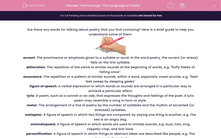Are there any words for talking about poetry that you find confusing? Here is a brief guide to help you understand some of them:
.jpg)
accent: The prominence or emphasis given to a syllable or word. In the word poetry, the accent (or stress) falls on the first syllable.
alliteration: The repetition of the same or similar sounds at the beginning of words, e.g. "fluffy flakes of falling snow".
assonance: The repetition or a pattern of similar sounds, within a word, especially vowel sounds, e.g. "fleet feet sweep by sleeping geeks"
figure of speech: A verbal expression in which words or sounds are arranged in a particular way to achieve a particular effect.
lyric: A poem, such as a sonnet or an ode, that expresses the thoughts and feelings of the poet. A lyric poem may resemble a song in form or style.
meter: The arrangement of a line of poetry by the number of syllables and the rhythm of accented (or stressed) syllables.
metaphor: A figure of speech in which two things are compared, by saying one thing is another, e.g. The sea is an angry dog.
onomatopoeia: A figure of speech in which words are used to imitate sounds, e.g. buzz, hiss, zing, clippety-clop, and tick-tock.
personification: A figure of speech in which things or abstract ideas are described like people, e.g. The autumn wind's a pirate.
quotation: Exact words taken from a poem, maybe when writing about it. refrain (or chorus): A line or group of lines that is repeated throughout a poem, usually after every stanza.
rhyme: When the same or similar sounds are at the end of two or more words.
rhyming couplet: In a poem, a pair of lines that rhyme, are the same length and form a complete thought.
rhythm: The beat of the poem, how the words are arranged in a pattern.
simile: A figure of speech in which two things are compared using the word "like" or "as", e.g. as hot as mustard.
stanza: A verse of a poem.
sonnet: A lyric poem that is 14 lines long
stress: see 'accent'. The emphasis given to particular syllables. Stressed syllables usually stand out because they have long, rather than short, vowels,
theme: What the poem is about, or the message it is giving.







